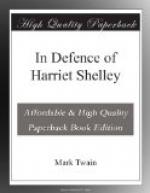Shelley’s happiness in his home had been wounded and bruised almost to death, fourthly, by the introduction there of a wet-nurse. The wet-nurse was introduced at the time of the Edinburgh sojourn, immediately after Shelley had been enjoying the two months of study with Cornelia which broke up his wife’s studies and destroyed his personal interest in them. Why, by this time, nothing that Shelley’s wife could do would have been satisfactory to him, for he was in love with another woman, and was never going to be contented again until he got back to her. If he had been still in love with his wife it is not easily conceivable that he would care much who nursed the baby, provided the baby was well nursed. Harriet’s jealousy was assuredly voicing itself now, Shelley’s conscience was assuredly nagging him, pestering him, persecuting him. Shelley needed excuses for his altered attitude towards his wife; Providence pitied him and sent the wet-nurse. If Providence had sent him a cotton doughnut it would have answered just as well; all he wanted was something to find fault with.
Shelley’s happiness in his home had been wounded and bruised almost to death, fifthly, because Harriet narrowly watched a surgical operation which was being performed upon her child, and, “to the astonishment of the operator,” who was watching Harriet instead of attending to his operation, she betrayed “not the smallest sign of emotion.” The author of this biography was not ashamed to set down that exultant slander. He was apparently not aware that it was a small business to bring into his court a witness whose name he does not know, and whose character and veracity there is none to vouch for, and allow him to strike this blow at the mother-heart of this friendless girl. The biographer says, “We may not infer from this that Harriet did not feel”—why put it in, then?— “but we learn that those about her could believe her to be hard and insensible.” Who were those who were about her? Her husband? He hated her now, because he was in love elsewhere. Her sister? Of course that is not charged. Peacock? Peacock does not testify. The wet-nurse? She does not testify. If any others were there we have no mention of them. “Those about her” are reduced to one person—her husband. Who reports the circumstance? It is Hogg. Perhaps he was there—we do not know. But if he was, he still got his information at second-hand, as it was the operator who noticed Harriet’s lack of emotion, not himself. Hogg is not given to saying kind things when Harriet is his subject. He may have said them the time that he tried to tempt her to soil her honor, but after that he mentions her usually with a sneer. “Among those who were about her” was one witness well equipped to silence all tongues, abolish all doubts, set our minds at rest; one witness, not called, and not callable, whose evidence, if we could but get it, would outweigh the oaths of whole battalions of hostile Hoggs and nameless surgeons—the baby. I wish we had the baby’s testimony; and yet if we had it it would not do us any good—a furtive conjecture, a sly insinuation, a pious “if” or two, would be smuggled in, here and there, with a solemn air of judicial investigation, and its positiveness would wilt into dubiety.




